Ethical Practices in Law Enforcement: Ethical Considerations
VerifiedAdded on 2023/01/06
|12
|3455
|39
Essay
AI Summary
This essay delves into the ethical complexities of law enforcement, focusing on critical aspects such as ethical decision-making, the use of force, and the role of discretion and accountability. The introduction highlights the high ethical standards demanded of police officers, emphasizing the pressure and expectations placed upon them. The essay then examines ethical codes, both formal and informal, and their impact on officers' careers, including the powers given to police, such as shoot-to-kill powers. It discusses the need for responsible and competent fulfillment of the police mission and examines how discretion is a necessary and desirable attribute of policing. The essay explores the factors influencing police decisions, the implications of different policing methods, and the advantages and disadvantages of ethical methods adopted by officers. It analyzes the routine use of firearms, the legal authority of snipers, and the need for accountability. The essay also reviews the literature on police violence and the impact of policies and training, highlighting the need for clear standards and the challenges in categorizing shootings. The essay uses academic sources to support its arguments, including the Australian Criminology report and other studies on police ethics and decision-making.
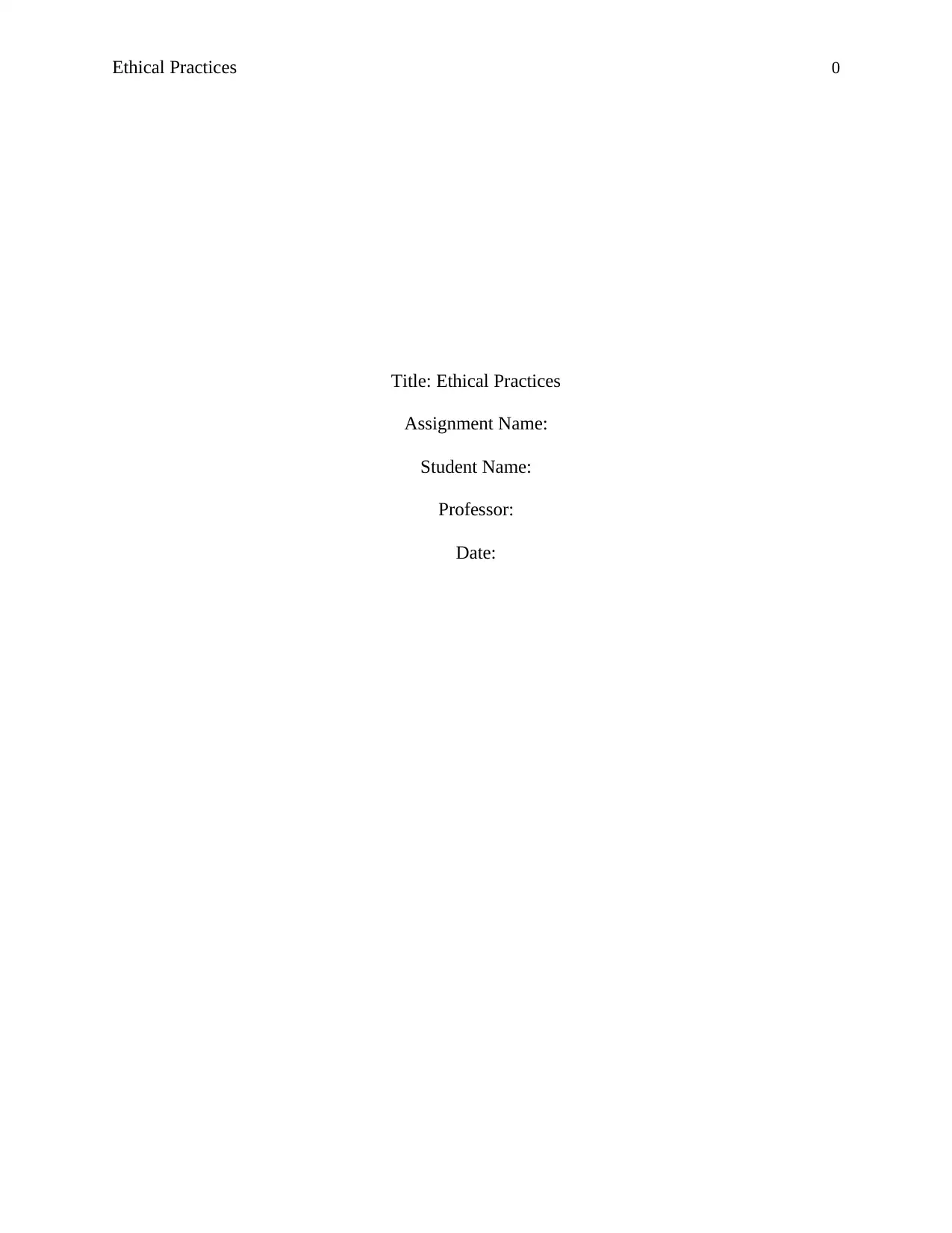
Ethical Practices 0
Title: Ethical Practices
Assignment Name:
Student Name:
Professor:
Date:
Title: Ethical Practices
Assignment Name:
Student Name:
Professor:
Date:
Paraphrase This Document
Need a fresh take? Get an instant paraphrase of this document with our AI Paraphraser
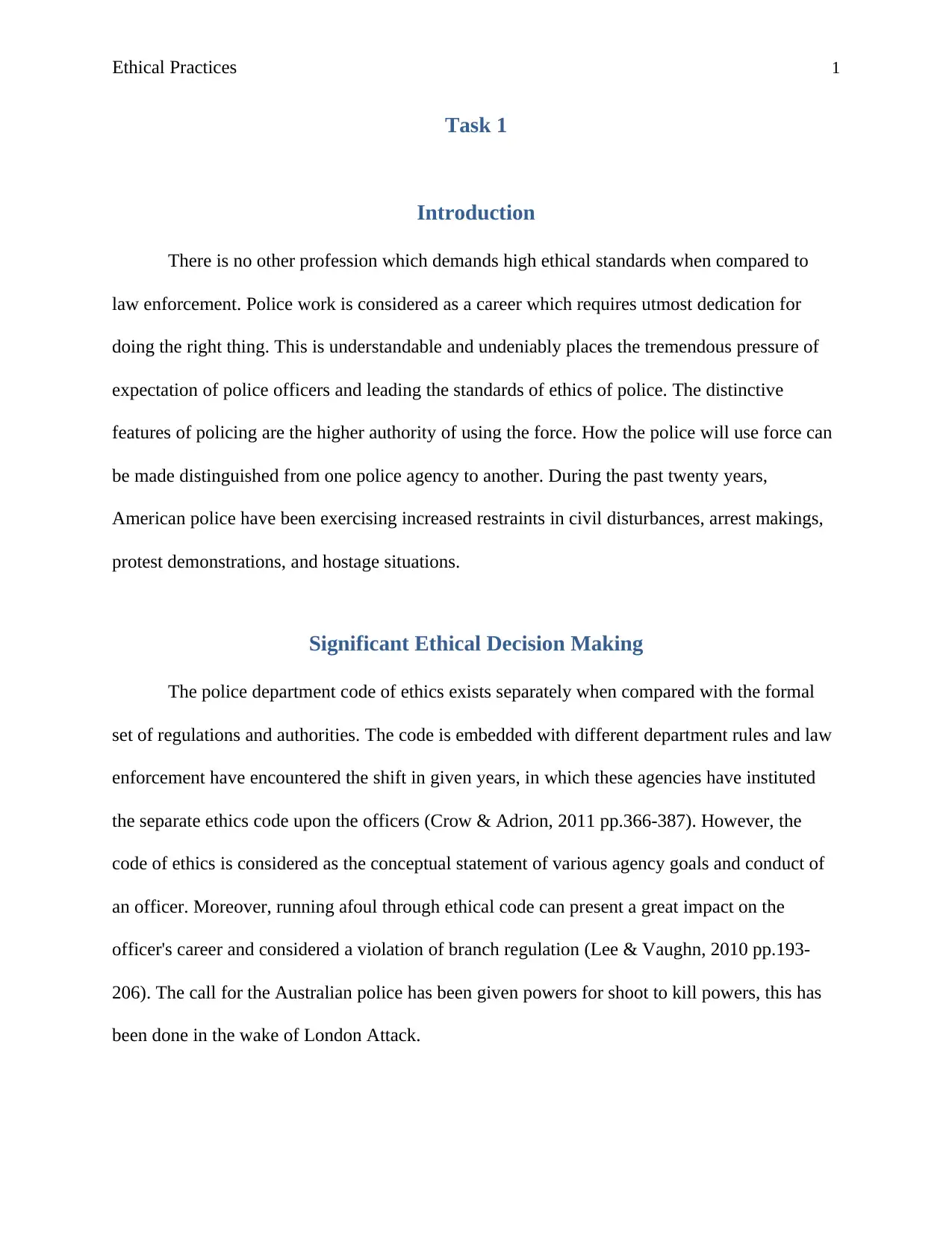
Ethical Practices 1
Task 1
Introduction
There is no other profession which demands high ethical standards when compared to
law enforcement. Police work is considered as a career which requires utmost dedication for
doing the right thing. This is understandable and undeniably places the tremendous pressure of
expectation of police officers and leading the standards of ethics of police. The distinctive
features of policing are the higher authority of using the force. How the police will use force can
be made distinguished from one police agency to another. During the past twenty years,
American police have been exercising increased restraints in civil disturbances, arrest makings,
protest demonstrations, and hostage situations.
Significant Ethical Decision Making
The police department code of ethics exists separately when compared with the formal
set of regulations and authorities. The code is embedded with different department rules and law
enforcement have encountered the shift in given years, in which these agencies have instituted
the separate ethics code upon the officers (Crow & Adrion, 2011 pp.366-387). However, the
code of ethics is considered as the conceptual statement of various agency goals and conduct of
an officer. Moreover, running afoul through ethical code can present a great impact on the
officer's career and considered a violation of branch regulation (Lee & Vaughn, 2010 pp.193-
206). The call for the Australian police has been given powers for shoot to kill powers, this has
been done in the wake of London Attack.
Task 1
Introduction
There is no other profession which demands high ethical standards when compared to
law enforcement. Police work is considered as a career which requires utmost dedication for
doing the right thing. This is understandable and undeniably places the tremendous pressure of
expectation of police officers and leading the standards of ethics of police. The distinctive
features of policing are the higher authority of using the force. How the police will use force can
be made distinguished from one police agency to another. During the past twenty years,
American police have been exercising increased restraints in civil disturbances, arrest makings,
protest demonstrations, and hostage situations.
Significant Ethical Decision Making
The police department code of ethics exists separately when compared with the formal
set of regulations and authorities. The code is embedded with different department rules and law
enforcement have encountered the shift in given years, in which these agencies have instituted
the separate ethics code upon the officers (Crow & Adrion, 2011 pp.366-387). However, the
code of ethics is considered as the conceptual statement of various agency goals and conduct of
an officer. Moreover, running afoul through ethical code can present a great impact on the
officer's career and considered a violation of branch regulation (Lee & Vaughn, 2010 pp.193-
206). The call for the Australian police has been given powers for shoot to kill powers, this has
been done in the wake of London Attack.
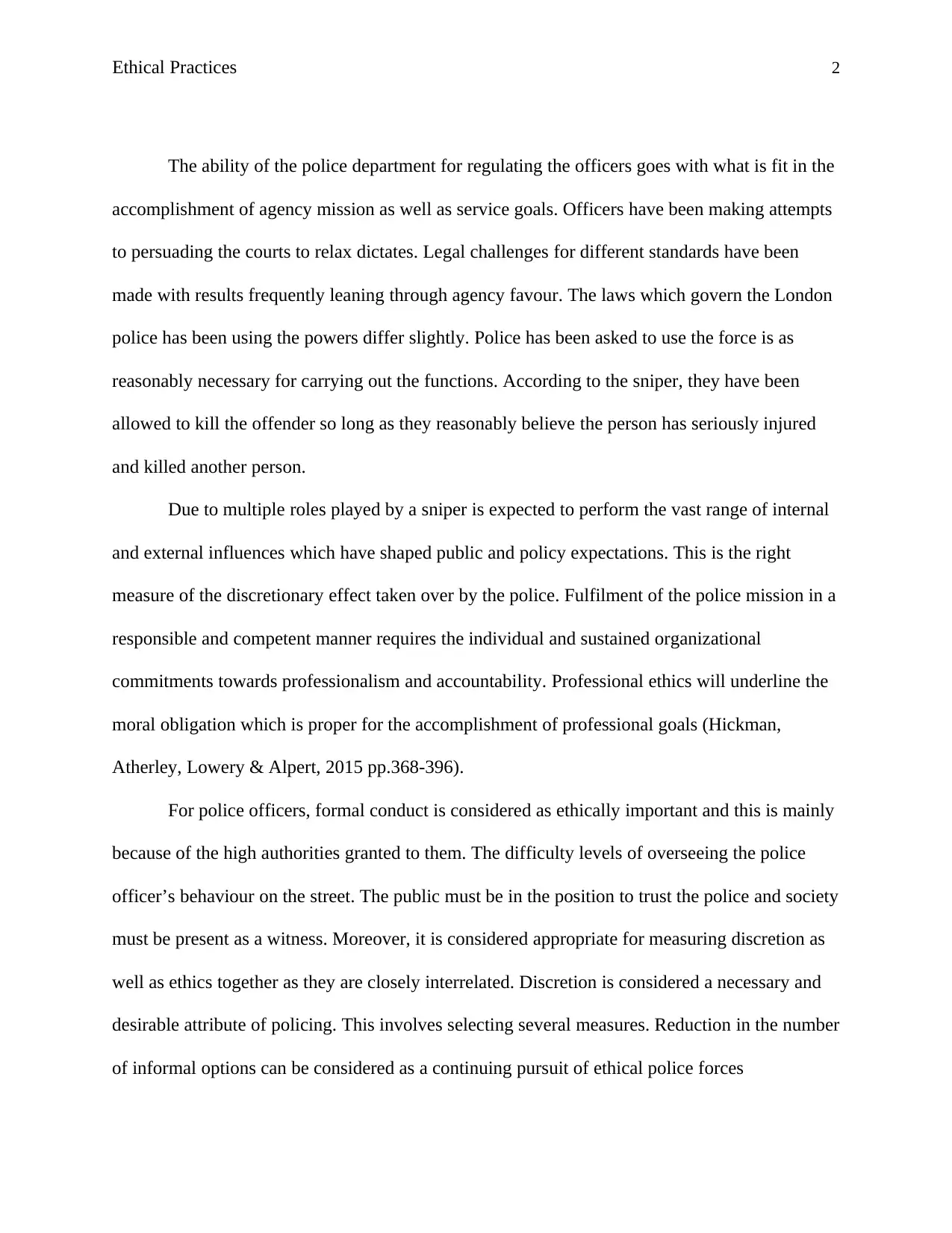
Ethical Practices 2
The ability of the police department for regulating the officers goes with what is fit in the
accomplishment of agency mission as well as service goals. Officers have been making attempts
to persuading the courts to relax dictates. Legal challenges for different standards have been
made with results frequently leaning through agency favour. The laws which govern the London
police has been using the powers differ slightly. Police has been asked to use the force is as
reasonably necessary for carrying out the functions. According to the sniper, they have been
allowed to kill the offender so long as they reasonably believe the person has seriously injured
and killed another person.
Due to multiple roles played by a sniper is expected to perform the vast range of internal
and external influences which have shaped public and policy expectations. This is the right
measure of the discretionary effect taken over by the police. Fulfilment of the police mission in a
responsible and competent manner requires the individual and sustained organizational
commitments towards professionalism and accountability. Professional ethics will underline the
moral obligation which is proper for the accomplishment of professional goals (Hickman,
Atherley, Lowery & Alpert, 2015 pp.368-396).
For police officers, formal conduct is considered as ethically important and this is mainly
because of the high authorities granted to them. The difficulty levels of overseeing the police
officer’s behaviour on the street. The public must be in the position to trust the police and society
must be present as a witness. Moreover, it is considered appropriate for measuring discretion as
well as ethics together as they are closely interrelated. Discretion is considered a necessary and
desirable attribute of policing. This involves selecting several measures. Reduction in the number
of informal options can be considered as a continuing pursuit of ethical police forces
The ability of the police department for regulating the officers goes with what is fit in the
accomplishment of agency mission as well as service goals. Officers have been making attempts
to persuading the courts to relax dictates. Legal challenges for different standards have been
made with results frequently leaning through agency favour. The laws which govern the London
police has been using the powers differ slightly. Police has been asked to use the force is as
reasonably necessary for carrying out the functions. According to the sniper, they have been
allowed to kill the offender so long as they reasonably believe the person has seriously injured
and killed another person.
Due to multiple roles played by a sniper is expected to perform the vast range of internal
and external influences which have shaped public and policy expectations. This is the right
measure of the discretionary effect taken over by the police. Fulfilment of the police mission in a
responsible and competent manner requires the individual and sustained organizational
commitments towards professionalism and accountability. Professional ethics will underline the
moral obligation which is proper for the accomplishment of professional goals (Hickman,
Atherley, Lowery & Alpert, 2015 pp.368-396).
For police officers, formal conduct is considered as ethically important and this is mainly
because of the high authorities granted to them. The difficulty levels of overseeing the police
officer’s behaviour on the street. The public must be in the position to trust the police and society
must be present as a witness. Moreover, it is considered appropriate for measuring discretion as
well as ethics together as they are closely interrelated. Discretion is considered a necessary and
desirable attribute of policing. This involves selecting several measures. Reduction in the number
of informal options can be considered as a continuing pursuit of ethical police forces
⊘ This is a preview!⊘
Do you want full access?
Subscribe today to unlock all pages.

Trusted by 1+ million students worldwide
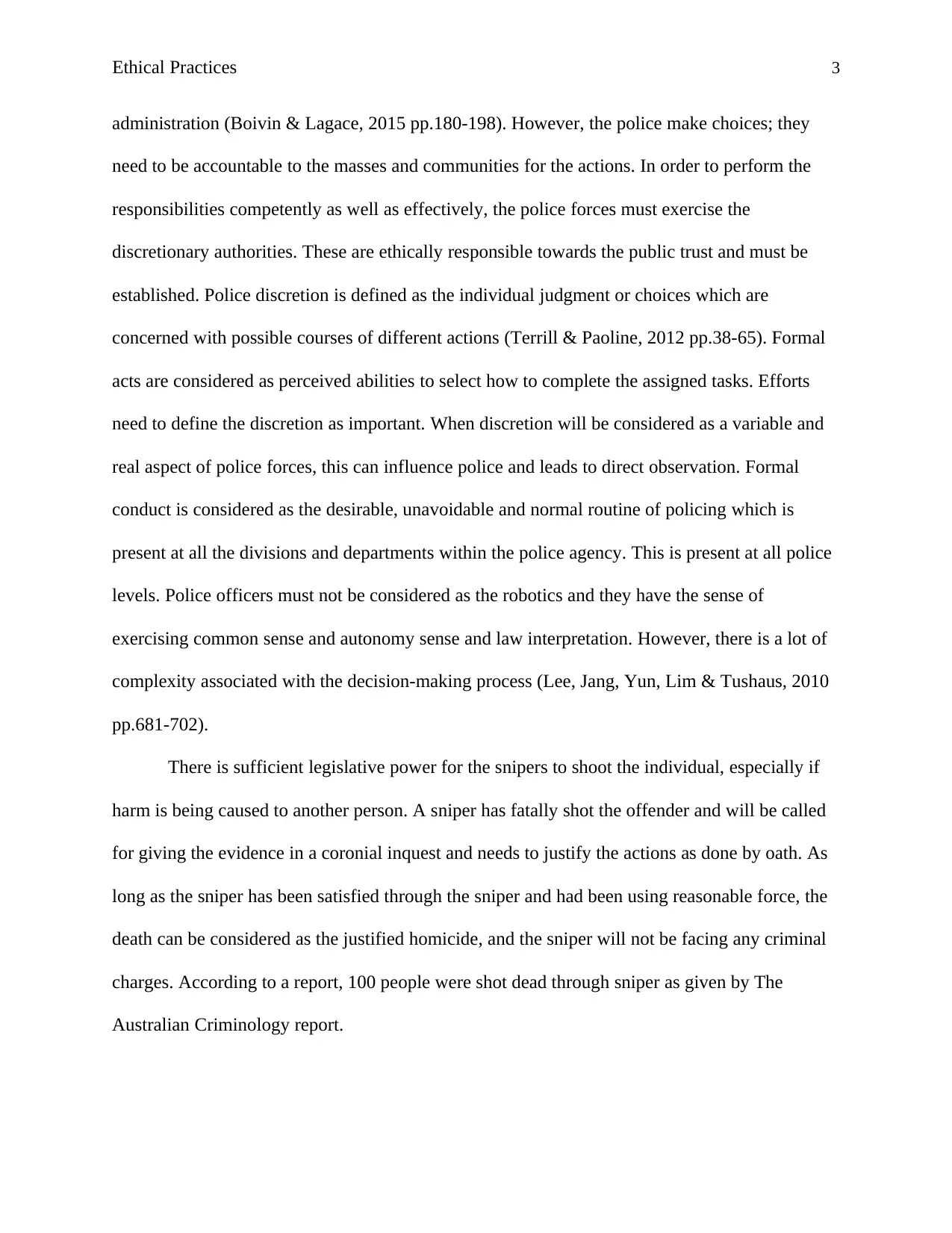
Ethical Practices 3
administration (Boivin & Lagace, 2015 pp.180-198). However, the police make choices; they
need to be accountable to the masses and communities for the actions. In order to perform the
responsibilities competently as well as effectively, the police forces must exercise the
discretionary authorities. These are ethically responsible towards the public trust and must be
established. Police discretion is defined as the individual judgment or choices which are
concerned with possible courses of different actions (Terrill & Paoline, 2012 pp.38-65). Formal
acts are considered as perceived abilities to select how to complete the assigned tasks. Efforts
need to define the discretion as important. When discretion will be considered as a variable and
real aspect of police forces, this can influence police and leads to direct observation. Formal
conduct is considered as the desirable, unavoidable and normal routine of policing which is
present at all the divisions and departments within the police agency. This is present at all police
levels. Police officers must not be considered as the robotics and they have the sense of
exercising common sense and autonomy sense and law interpretation. However, there is a lot of
complexity associated with the decision-making process (Lee, Jang, Yun, Lim & Tushaus, 2010
pp.681-702).
There is sufficient legislative power for the snipers to shoot the individual, especially if
harm is being caused to another person. A sniper has fatally shot the offender and will be called
for giving the evidence in a coronial inquest and needs to justify the actions as done by oath. As
long as the sniper has been satisfied through the sniper and had been using reasonable force, the
death can be considered as the justified homicide, and the sniper will not be facing any criminal
charges. According to a report, 100 people were shot dead through sniper as given by The
Australian Criminology report.
administration (Boivin & Lagace, 2015 pp.180-198). However, the police make choices; they
need to be accountable to the masses and communities for the actions. In order to perform the
responsibilities competently as well as effectively, the police forces must exercise the
discretionary authorities. These are ethically responsible towards the public trust and must be
established. Police discretion is defined as the individual judgment or choices which are
concerned with possible courses of different actions (Terrill & Paoline, 2012 pp.38-65). Formal
acts are considered as perceived abilities to select how to complete the assigned tasks. Efforts
need to define the discretion as important. When discretion will be considered as a variable and
real aspect of police forces, this can influence police and leads to direct observation. Formal
conduct is considered as the desirable, unavoidable and normal routine of policing which is
present at all the divisions and departments within the police agency. This is present at all police
levels. Police officers must not be considered as the robotics and they have the sense of
exercising common sense and autonomy sense and law interpretation. However, there is a lot of
complexity associated with the decision-making process (Lee, Jang, Yun, Lim & Tushaus, 2010
pp.681-702).
There is sufficient legislative power for the snipers to shoot the individual, especially if
harm is being caused to another person. A sniper has fatally shot the offender and will be called
for giving the evidence in a coronial inquest and needs to justify the actions as done by oath. As
long as the sniper has been satisfied through the sniper and had been using reasonable force, the
death can be considered as the justified homicide, and the sniper will not be facing any criminal
charges. According to a report, 100 people were shot dead through sniper as given by The
Australian Criminology report.
Paraphrase This Document
Need a fresh take? Get an instant paraphrase of this document with our AI Paraphraser
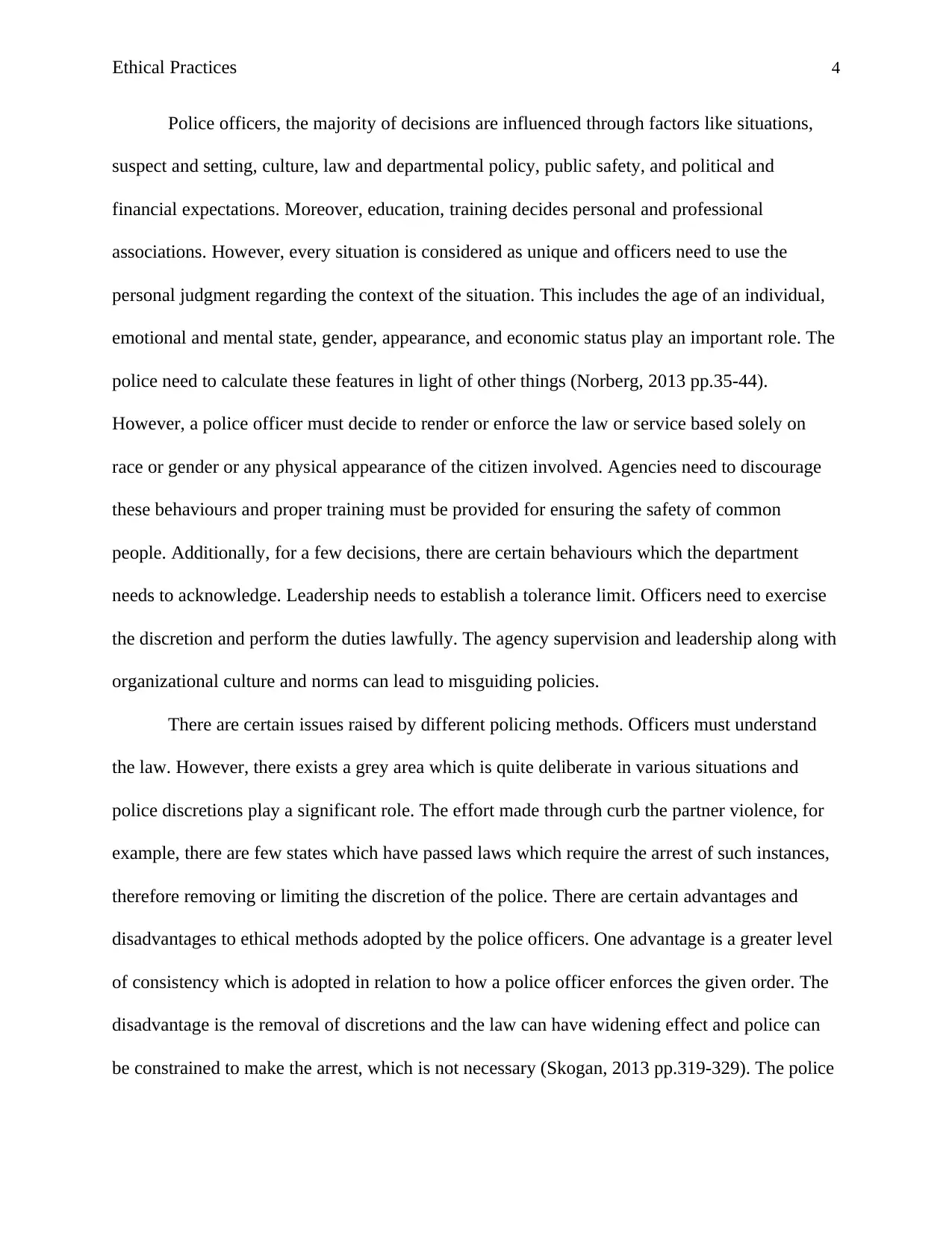
Ethical Practices 4
Police officers, the majority of decisions are influenced through factors like situations,
suspect and setting, culture, law and departmental policy, public safety, and political and
financial expectations. Moreover, education, training decides personal and professional
associations. However, every situation is considered as unique and officers need to use the
personal judgment regarding the context of the situation. This includes the age of an individual,
emotional and mental state, gender, appearance, and economic status play an important role. The
police need to calculate these features in light of other things (Norberg, 2013 pp.35-44).
However, a police officer must decide to render or enforce the law or service based solely on
race or gender or any physical appearance of the citizen involved. Agencies need to discourage
these behaviours and proper training must be provided for ensuring the safety of common
people. Additionally, for a few decisions, there are certain behaviours which the department
needs to acknowledge. Leadership needs to establish a tolerance limit. Officers need to exercise
the discretion and perform the duties lawfully. The agency supervision and leadership along with
organizational culture and norms can lead to misguiding policies.
There are certain issues raised by different policing methods. Officers must understand
the law. However, there exists a grey area which is quite deliberate in various situations and
police discretions play a significant role. The effort made through curb the partner violence, for
example, there are few states which have passed laws which require the arrest of such instances,
therefore removing or limiting the discretion of the police. There are certain advantages and
disadvantages to ethical methods adopted by the police officers. One advantage is a greater level
of consistency which is adopted in relation to how a police officer enforces the given order. The
disadvantage is the removal of discretions and the law can have widening effect and police can
be constrained to make the arrest, which is not necessary (Skogan, 2013 pp.319-329). The police
Police officers, the majority of decisions are influenced through factors like situations,
suspect and setting, culture, law and departmental policy, public safety, and political and
financial expectations. Moreover, education, training decides personal and professional
associations. However, every situation is considered as unique and officers need to use the
personal judgment regarding the context of the situation. This includes the age of an individual,
emotional and mental state, gender, appearance, and economic status play an important role. The
police need to calculate these features in light of other things (Norberg, 2013 pp.35-44).
However, a police officer must decide to render or enforce the law or service based solely on
race or gender or any physical appearance of the citizen involved. Agencies need to discourage
these behaviours and proper training must be provided for ensuring the safety of common
people. Additionally, for a few decisions, there are certain behaviours which the department
needs to acknowledge. Leadership needs to establish a tolerance limit. Officers need to exercise
the discretion and perform the duties lawfully. The agency supervision and leadership along with
organizational culture and norms can lead to misguiding policies.
There are certain issues raised by different policing methods. Officers must understand
the law. However, there exists a grey area which is quite deliberate in various situations and
police discretions play a significant role. The effort made through curb the partner violence, for
example, there are few states which have passed laws which require the arrest of such instances,
therefore removing or limiting the discretion of the police. There are certain advantages and
disadvantages to ethical methods adopted by the police officers. One advantage is a greater level
of consistency which is adopted in relation to how a police officer enforces the given order. The
disadvantage is the removal of discretions and the law can have widening effect and police can
be constrained to make the arrest, which is not necessary (Skogan, 2013 pp.319-329). The police
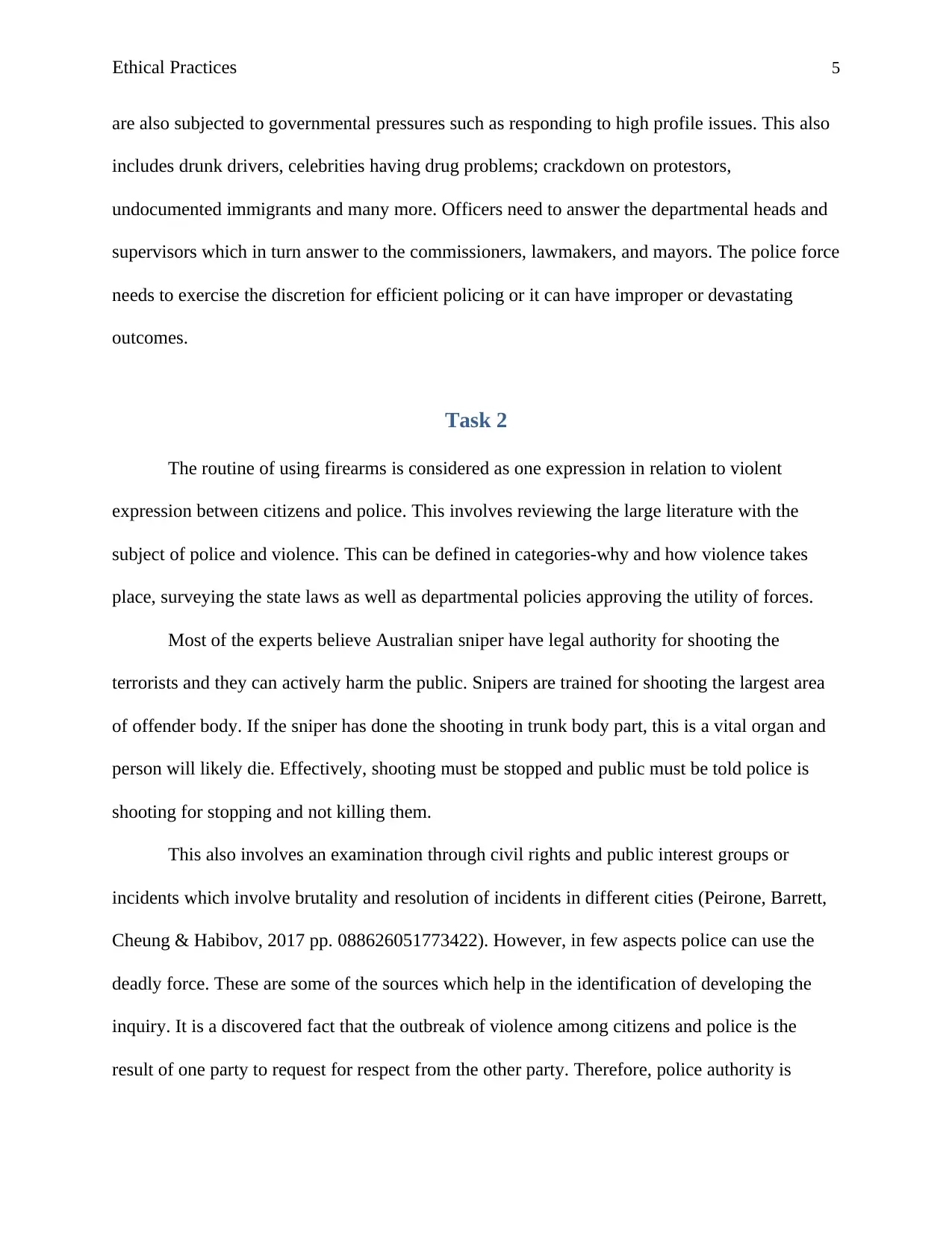
Ethical Practices 5
are also subjected to governmental pressures such as responding to high profile issues. This also
includes drunk drivers, celebrities having drug problems; crackdown on protestors,
undocumented immigrants and many more. Officers need to answer the departmental heads and
supervisors which in turn answer to the commissioners, lawmakers, and mayors. The police force
needs to exercise the discretion for efficient policing or it can have improper or devastating
outcomes.
Task 2
The routine of using firearms is considered as one expression in relation to violent
expression between citizens and police. This involves reviewing the large literature with the
subject of police and violence. This can be defined in categories-why and how violence takes
place, surveying the state laws as well as departmental policies approving the utility of forces.
Most of the experts believe Australian sniper have legal authority for shooting the
terrorists and they can actively harm the public. Snipers are trained for shooting the largest area
of offender body. If the sniper has done the shooting in trunk body part, this is a vital organ and
person will likely die. Effectively, shooting must be stopped and public must be told police is
shooting for stopping and not killing them.
This also involves an examination through civil rights and public interest groups or
incidents which involve brutality and resolution of incidents in different cities (Peirone, Barrett,
Cheung & Habibov, 2017 pp. 088626051773422). However, in few aspects police can use the
deadly force. These are some of the sources which help in the identification of developing the
inquiry. It is a discovered fact that the outbreak of violence among citizens and police is the
result of one party to request for respect from the other party. Therefore, police authority is
are also subjected to governmental pressures such as responding to high profile issues. This also
includes drunk drivers, celebrities having drug problems; crackdown on protestors,
undocumented immigrants and many more. Officers need to answer the departmental heads and
supervisors which in turn answer to the commissioners, lawmakers, and mayors. The police force
needs to exercise the discretion for efficient policing or it can have improper or devastating
outcomes.
Task 2
The routine of using firearms is considered as one expression in relation to violent
expression between citizens and police. This involves reviewing the large literature with the
subject of police and violence. This can be defined in categories-why and how violence takes
place, surveying the state laws as well as departmental policies approving the utility of forces.
Most of the experts believe Australian sniper have legal authority for shooting the
terrorists and they can actively harm the public. Snipers are trained for shooting the largest area
of offender body. If the sniper has done the shooting in trunk body part, this is a vital organ and
person will likely die. Effectively, shooting must be stopped and public must be told police is
shooting for stopping and not killing them.
This also involves an examination through civil rights and public interest groups or
incidents which involve brutality and resolution of incidents in different cities (Peirone, Barrett,
Cheung & Habibov, 2017 pp. 088626051773422). However, in few aspects police can use the
deadly force. These are some of the sources which help in the identification of developing the
inquiry. It is a discovered fact that the outbreak of violence among citizens and police is the
result of one party to request for respect from the other party. Therefore, police authority is
⊘ This is a preview!⊘
Do you want full access?
Subscribe today to unlock all pages.

Trusted by 1+ million students worldwide
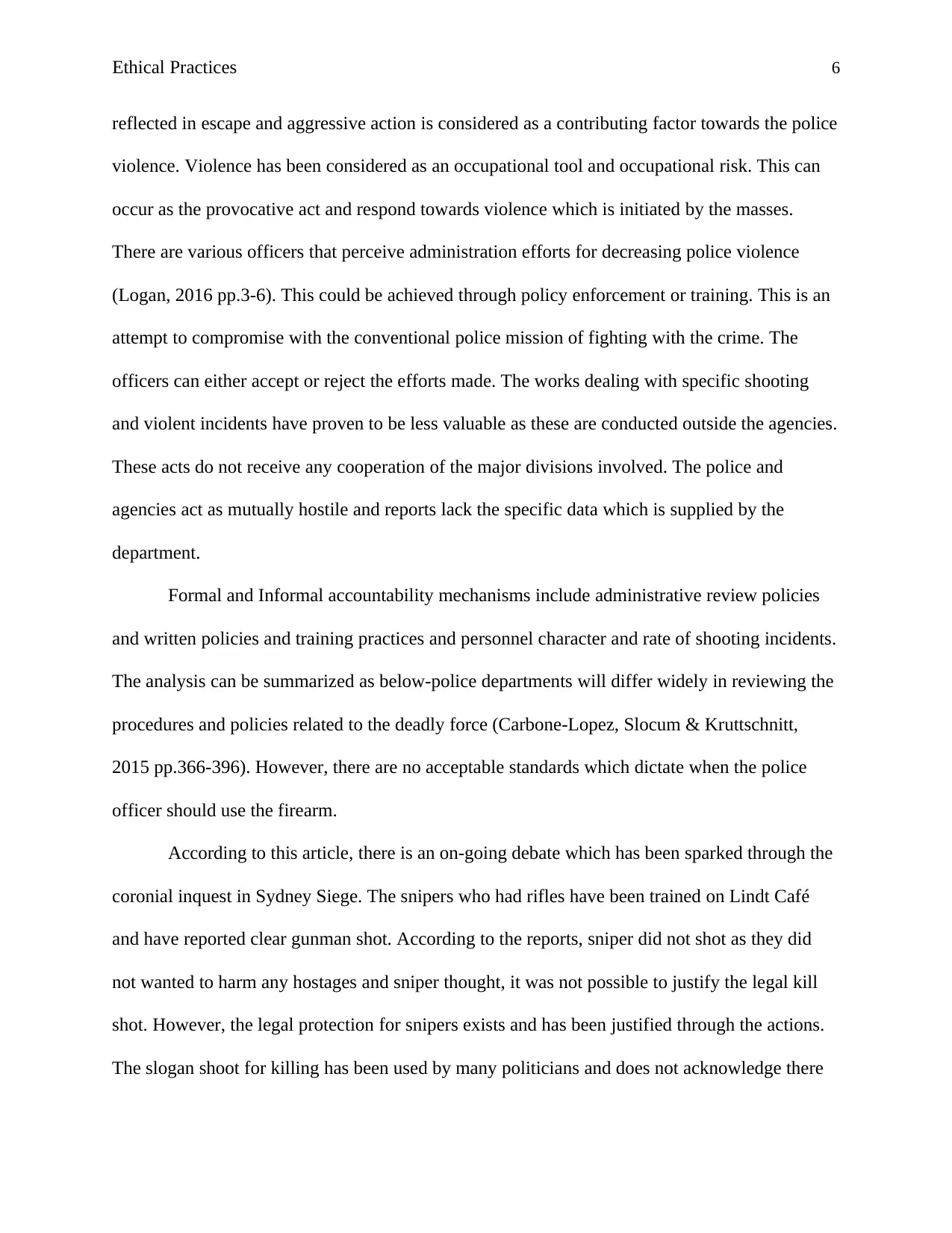
Ethical Practices 6
reflected in escape and aggressive action is considered as a contributing factor towards the police
violence. Violence has been considered as an occupational tool and occupational risk. This can
occur as the provocative act and respond towards violence which is initiated by the masses.
There are various officers that perceive administration efforts for decreasing police violence
(Logan, 2016 pp.3-6). This could be achieved through policy enforcement or training. This is an
attempt to compromise with the conventional police mission of fighting with the crime. The
officers can either accept or reject the efforts made. The works dealing with specific shooting
and violent incidents have proven to be less valuable as these are conducted outside the agencies.
These acts do not receive any cooperation of the major divisions involved. The police and
agencies act as mutually hostile and reports lack the specific data which is supplied by the
department.
Formal and Informal accountability mechanisms include administrative review policies
and written policies and training practices and personnel character and rate of shooting incidents.
The analysis can be summarized as below-police departments will differ widely in reviewing the
procedures and policies related to the deadly force (Carbone-Lopez, Slocum & Kruttschnitt,
2015 pp.366-396). However, there are no acceptable standards which dictate when the police
officer should use the firearm.
According to this article, there is an on-going debate which has been sparked through the
coronial inquest in Sydney Siege. The snipers who had rifles have been trained on Lindt Café
and have reported clear gunman shot. According to the reports, sniper did not shot as they did
not wanted to harm any hostages and sniper thought, it was not possible to justify the legal kill
shot. However, the legal protection for snipers exists and has been justified through the actions.
The slogan shoot for killing has been used by many politicians and does not acknowledge there
reflected in escape and aggressive action is considered as a contributing factor towards the police
violence. Violence has been considered as an occupational tool and occupational risk. This can
occur as the provocative act and respond towards violence which is initiated by the masses.
There are various officers that perceive administration efforts for decreasing police violence
(Logan, 2016 pp.3-6). This could be achieved through policy enforcement or training. This is an
attempt to compromise with the conventional police mission of fighting with the crime. The
officers can either accept or reject the efforts made. The works dealing with specific shooting
and violent incidents have proven to be less valuable as these are conducted outside the agencies.
These acts do not receive any cooperation of the major divisions involved. The police and
agencies act as mutually hostile and reports lack the specific data which is supplied by the
department.
Formal and Informal accountability mechanisms include administrative review policies
and written policies and training practices and personnel character and rate of shooting incidents.
The analysis can be summarized as below-police departments will differ widely in reviewing the
procedures and policies related to the deadly force (Carbone-Lopez, Slocum & Kruttschnitt,
2015 pp.366-396). However, there are no acceptable standards which dictate when the police
officer should use the firearm.
According to this article, there is an on-going debate which has been sparked through the
coronial inquest in Sydney Siege. The snipers who had rifles have been trained on Lindt Café
and have reported clear gunman shot. According to the reports, sniper did not shot as they did
not wanted to harm any hostages and sniper thought, it was not possible to justify the legal kill
shot. However, the legal protection for snipers exists and has been justified through the actions.
The slogan shoot for killing has been used by many politicians and does not acknowledge there
Paraphrase This Document
Need a fresh take? Get an instant paraphrase of this document with our AI Paraphraser
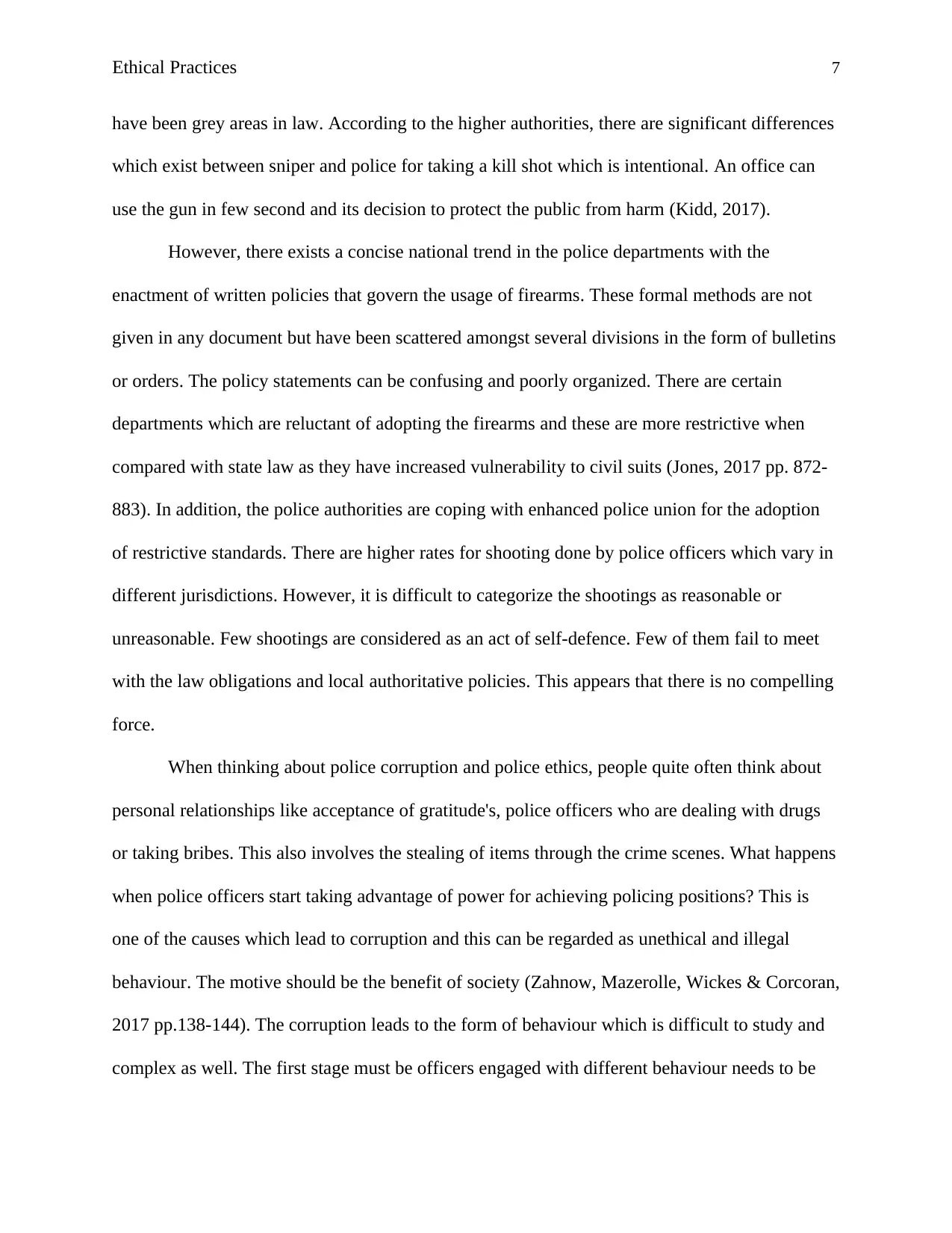
Ethical Practices 7
have been grey areas in law. According to the higher authorities, there are significant differences
which exist between sniper and police for taking a kill shot which is intentional. An office can
use the gun in few second and its decision to protect the public from harm (Kidd, 2017).
However, there exists a concise national trend in the police departments with the
enactment of written policies that govern the usage of firearms. These formal methods are not
given in any document but have been scattered amongst several divisions in the form of bulletins
or orders. The policy statements can be confusing and poorly organized. There are certain
departments which are reluctant of adopting the firearms and these are more restrictive when
compared with state law as they have increased vulnerability to civil suits (Jones, 2017 pp. 872-
883). In addition, the police authorities are coping with enhanced police union for the adoption
of restrictive standards. There are higher rates for shooting done by police officers which vary in
different jurisdictions. However, it is difficult to categorize the shootings as reasonable or
unreasonable. Few shootings are considered as an act of self-defence. Few of them fail to meet
with the law obligations and local authoritative policies. This appears that there is no compelling
force.
When thinking about police corruption and police ethics, people quite often think about
personal relationships like acceptance of gratitude's, police officers who are dealing with drugs
or taking bribes. This also involves the stealing of items through the crime scenes. What happens
when police officers start taking advantage of power for achieving policing positions? This is
one of the causes which lead to corruption and this can be regarded as unethical and illegal
behaviour. The motive should be the benefit of society (Zahnow, Mazerolle, Wickes & Corcoran,
2017 pp.138-144). The corruption leads to the form of behaviour which is difficult to study and
complex as well. The first stage must be officers engaged with different behaviour needs to be
have been grey areas in law. According to the higher authorities, there are significant differences
which exist between sniper and police for taking a kill shot which is intentional. An office can
use the gun in few second and its decision to protect the public from harm (Kidd, 2017).
However, there exists a concise national trend in the police departments with the
enactment of written policies that govern the usage of firearms. These formal methods are not
given in any document but have been scattered amongst several divisions in the form of bulletins
or orders. The policy statements can be confusing and poorly organized. There are certain
departments which are reluctant of adopting the firearms and these are more restrictive when
compared with state law as they have increased vulnerability to civil suits (Jones, 2017 pp. 872-
883). In addition, the police authorities are coping with enhanced police union for the adoption
of restrictive standards. There are higher rates for shooting done by police officers which vary in
different jurisdictions. However, it is difficult to categorize the shootings as reasonable or
unreasonable. Few shootings are considered as an act of self-defence. Few of them fail to meet
with the law obligations and local authoritative policies. This appears that there is no compelling
force.
When thinking about police corruption and police ethics, people quite often think about
personal relationships like acceptance of gratitude's, police officers who are dealing with drugs
or taking bribes. This also involves the stealing of items through the crime scenes. What happens
when police officers start taking advantage of power for achieving policing positions? This is
one of the causes which lead to corruption and this can be regarded as unethical and illegal
behaviour. The motive should be the benefit of society (Zahnow, Mazerolle, Wickes & Corcoran,
2017 pp.138-144). The corruption leads to the form of behaviour which is difficult to study and
complex as well. The first stage must be officers engaged with different behaviour needs to be
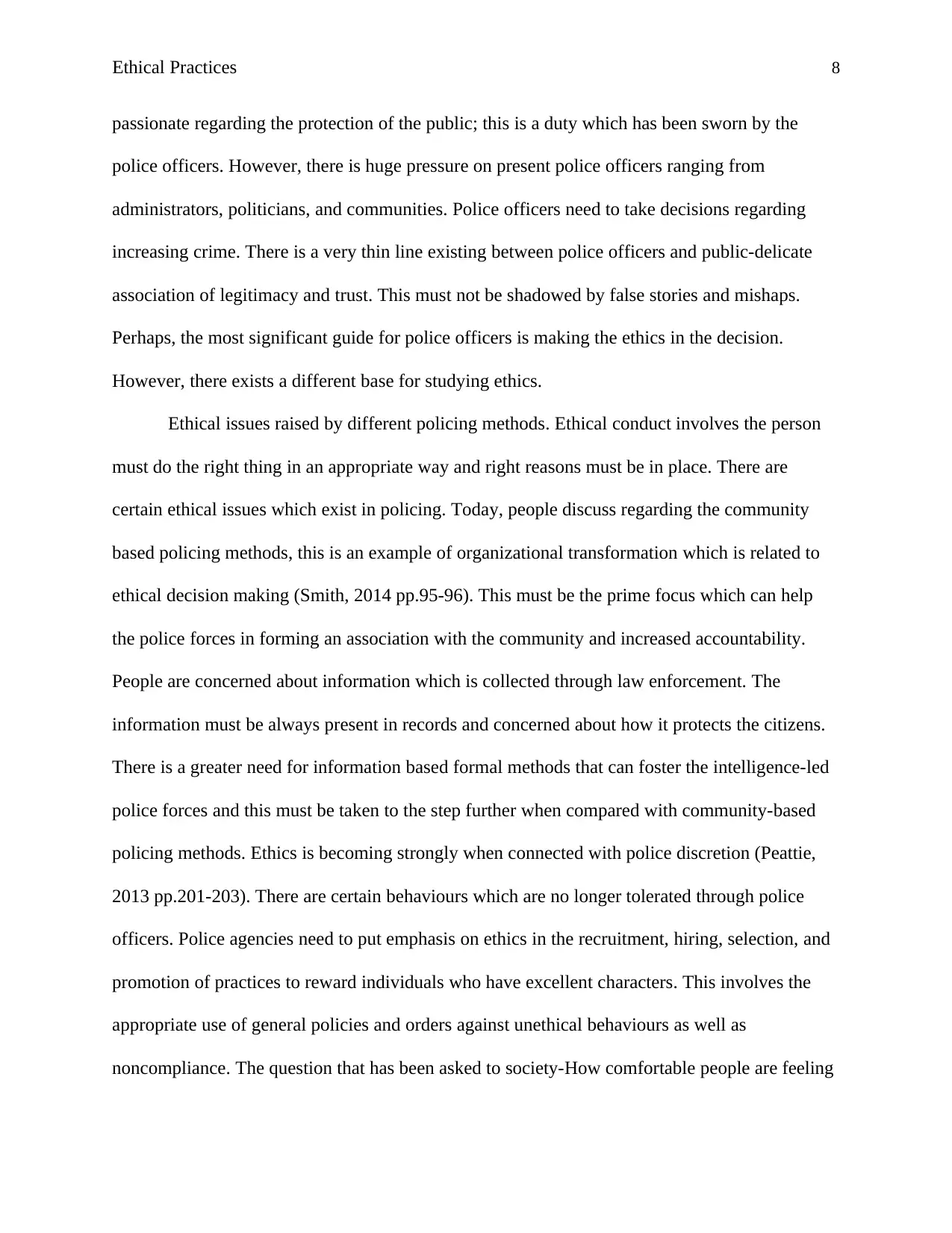
Ethical Practices 8
passionate regarding the protection of the public; this is a duty which has been sworn by the
police officers. However, there is huge pressure on present police officers ranging from
administrators, politicians, and communities. Police officers need to take decisions regarding
increasing crime. There is a very thin line existing between police officers and public-delicate
association of legitimacy and trust. This must not be shadowed by false stories and mishaps.
Perhaps, the most significant guide for police officers is making the ethics in the decision.
However, there exists a different base for studying ethics.
Ethical issues raised by different policing methods. Ethical conduct involves the person
must do the right thing in an appropriate way and right reasons must be in place. There are
certain ethical issues which exist in policing. Today, people discuss regarding the community
based policing methods, this is an example of organizational transformation which is related to
ethical decision making (Smith, 2014 pp.95-96). This must be the prime focus which can help
the police forces in forming an association with the community and increased accountability.
People are concerned about information which is collected through law enforcement. The
information must be always present in records and concerned about how it protects the citizens.
There is a greater need for information based formal methods that can foster the intelligence-led
police forces and this must be taken to the step further when compared with community-based
policing methods. Ethics is becoming strongly when connected with police discretion (Peattie,
2013 pp.201-203). There are certain behaviours which are no longer tolerated through police
officers. Police agencies need to put emphasis on ethics in the recruitment, hiring, selection, and
promotion of practices to reward individuals who have excellent characters. This involves the
appropriate use of general policies and orders against unethical behaviours as well as
noncompliance. The question that has been asked to society-How comfortable people are feeling
passionate regarding the protection of the public; this is a duty which has been sworn by the
police officers. However, there is huge pressure on present police officers ranging from
administrators, politicians, and communities. Police officers need to take decisions regarding
increasing crime. There is a very thin line existing between police officers and public-delicate
association of legitimacy and trust. This must not be shadowed by false stories and mishaps.
Perhaps, the most significant guide for police officers is making the ethics in the decision.
However, there exists a different base for studying ethics.
Ethical issues raised by different policing methods. Ethical conduct involves the person
must do the right thing in an appropriate way and right reasons must be in place. There are
certain ethical issues which exist in policing. Today, people discuss regarding the community
based policing methods, this is an example of organizational transformation which is related to
ethical decision making (Smith, 2014 pp.95-96). This must be the prime focus which can help
the police forces in forming an association with the community and increased accountability.
People are concerned about information which is collected through law enforcement. The
information must be always present in records and concerned about how it protects the citizens.
There is a greater need for information based formal methods that can foster the intelligence-led
police forces and this must be taken to the step further when compared with community-based
policing methods. Ethics is becoming strongly when connected with police discretion (Peattie,
2013 pp.201-203). There are certain behaviours which are no longer tolerated through police
officers. Police agencies need to put emphasis on ethics in the recruitment, hiring, selection, and
promotion of practices to reward individuals who have excellent characters. This involves the
appropriate use of general policies and orders against unethical behaviours as well as
noncompliance. The question that has been asked to society-How comfortable people are feeling
⊘ This is a preview!⊘
Do you want full access?
Subscribe today to unlock all pages.

Trusted by 1+ million students worldwide
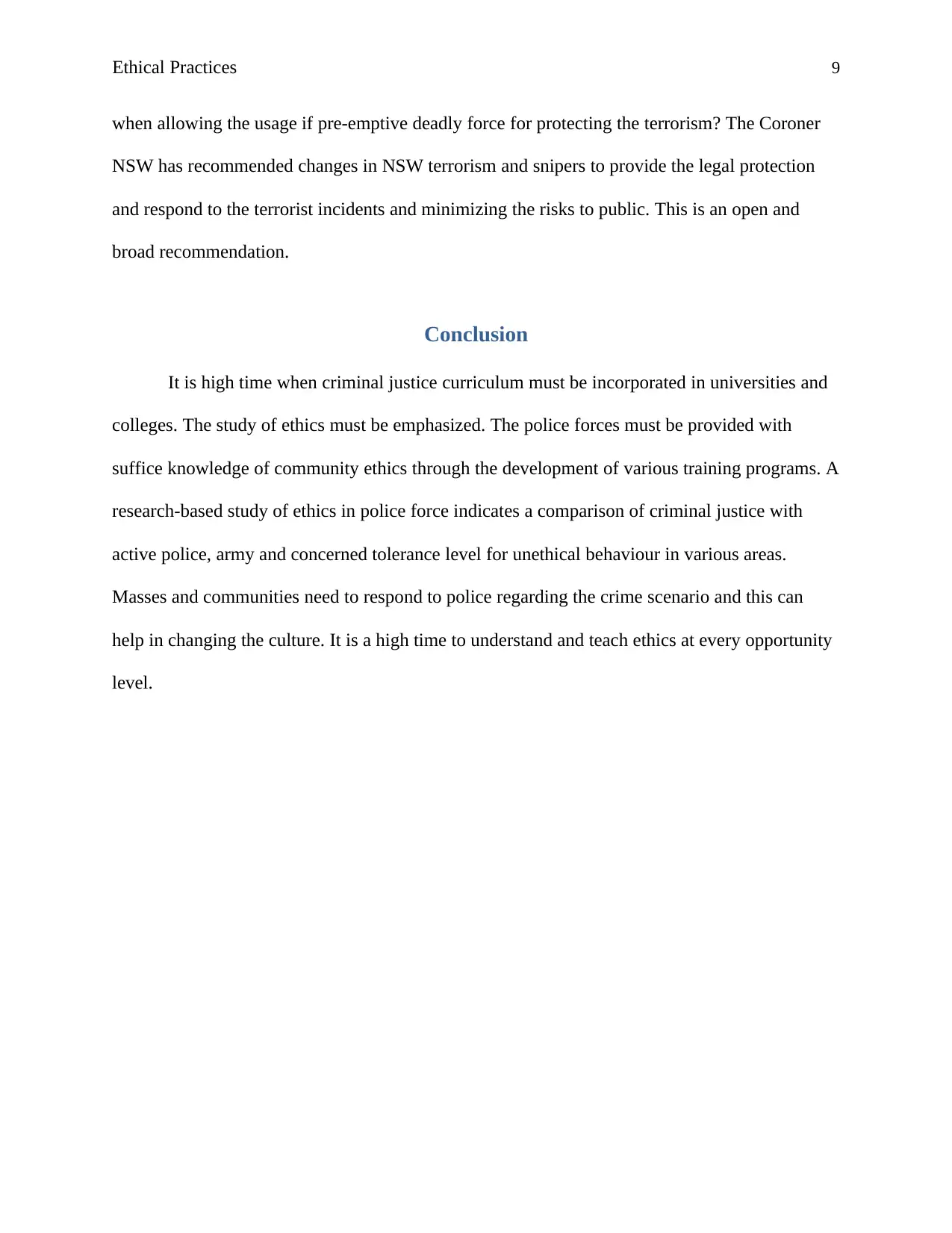
Ethical Practices 9
when allowing the usage if pre-emptive deadly force for protecting the terrorism? The Coroner
NSW has recommended changes in NSW terrorism and snipers to provide the legal protection
and respond to the terrorist incidents and minimizing the risks to public. This is an open and
broad recommendation.
Conclusion
It is high time when criminal justice curriculum must be incorporated in universities and
colleges. The study of ethics must be emphasized. The police forces must be provided with
suffice knowledge of community ethics through the development of various training programs. A
research-based study of ethics in police force indicates a comparison of criminal justice with
active police, army and concerned tolerance level for unethical behaviour in various areas.
Masses and communities need to respond to police regarding the crime scenario and this can
help in changing the culture. It is a high time to understand and teach ethics at every opportunity
level.
when allowing the usage if pre-emptive deadly force for protecting the terrorism? The Coroner
NSW has recommended changes in NSW terrorism and snipers to provide the legal protection
and respond to the terrorist incidents and minimizing the risks to public. This is an open and
broad recommendation.
Conclusion
It is high time when criminal justice curriculum must be incorporated in universities and
colleges. The study of ethics must be emphasized. The police forces must be provided with
suffice knowledge of community ethics through the development of various training programs. A
research-based study of ethics in police force indicates a comparison of criminal justice with
active police, army and concerned tolerance level for unethical behaviour in various areas.
Masses and communities need to respond to police regarding the crime scenario and this can
help in changing the culture. It is a high time to understand and teach ethics at every opportunity
level.
Paraphrase This Document
Need a fresh take? Get an instant paraphrase of this document with our AI Paraphraser
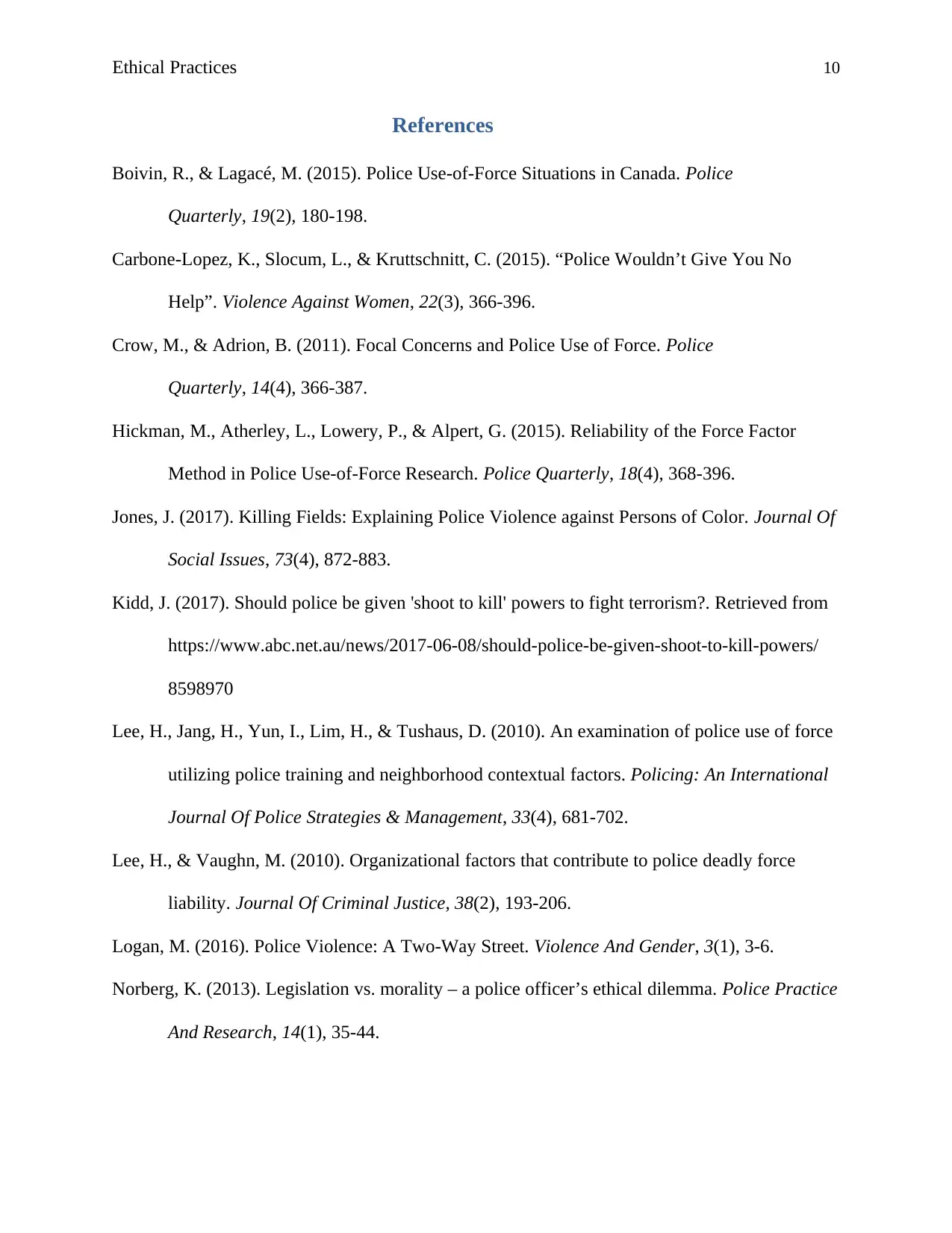
Ethical Practices 10
References
Boivin, R., & Lagacé, M. (2015). Police Use-of-Force Situations in Canada. Police
Quarterly, 19(2), 180-198.
Carbone-Lopez, K., Slocum, L., & Kruttschnitt, C. (2015). “Police Wouldn’t Give You No
Help”. Violence Against Women, 22(3), 366-396.
Crow, M., & Adrion, B. (2011). Focal Concerns and Police Use of Force. Police
Quarterly, 14(4), 366-387.
Hickman, M., Atherley, L., Lowery, P., & Alpert, G. (2015). Reliability of the Force Factor
Method in Police Use-of-Force Research. Police Quarterly, 18(4), 368-396.
Jones, J. (2017). Killing Fields: Explaining Police Violence against Persons of Color. Journal Of
Social Issues, 73(4), 872-883.
Kidd, J. (2017). Should police be given 'shoot to kill' powers to fight terrorism?. Retrieved from
https://www.abc.net.au/news/2017-06-08/should-police-be-given-shoot-to-kill-powers/
8598970
Lee, H., Jang, H., Yun, I., Lim, H., & Tushaus, D. (2010). An examination of police use of force
utilizing police training and neighborhood contextual factors. Policing: An International
Journal Of Police Strategies & Management, 33(4), 681-702.
Lee, H., & Vaughn, M. (2010). Organizational factors that contribute to police deadly force
liability. Journal Of Criminal Justice, 38(2), 193-206.
Logan, M. (2016). Police Violence: A Two-Way Street. Violence And Gender, 3(1), 3-6.
Norberg, K. (2013). Legislation vs. morality – a police officer’s ethical dilemma. Police Practice
And Research, 14(1), 35-44.
References
Boivin, R., & Lagacé, M. (2015). Police Use-of-Force Situations in Canada. Police
Quarterly, 19(2), 180-198.
Carbone-Lopez, K., Slocum, L., & Kruttschnitt, C. (2015). “Police Wouldn’t Give You No
Help”. Violence Against Women, 22(3), 366-396.
Crow, M., & Adrion, B. (2011). Focal Concerns and Police Use of Force. Police
Quarterly, 14(4), 366-387.
Hickman, M., Atherley, L., Lowery, P., & Alpert, G. (2015). Reliability of the Force Factor
Method in Police Use-of-Force Research. Police Quarterly, 18(4), 368-396.
Jones, J. (2017). Killing Fields: Explaining Police Violence against Persons of Color. Journal Of
Social Issues, 73(4), 872-883.
Kidd, J. (2017). Should police be given 'shoot to kill' powers to fight terrorism?. Retrieved from
https://www.abc.net.au/news/2017-06-08/should-police-be-given-shoot-to-kill-powers/
8598970
Lee, H., Jang, H., Yun, I., Lim, H., & Tushaus, D. (2010). An examination of police use of force
utilizing police training and neighborhood contextual factors. Policing: An International
Journal Of Police Strategies & Management, 33(4), 681-702.
Lee, H., & Vaughn, M. (2010). Organizational factors that contribute to police deadly force
liability. Journal Of Criminal Justice, 38(2), 193-206.
Logan, M. (2016). Police Violence: A Two-Way Street. Violence And Gender, 3(1), 3-6.
Norberg, K. (2013). Legislation vs. morality – a police officer’s ethical dilemma. Police Practice
And Research, 14(1), 35-44.
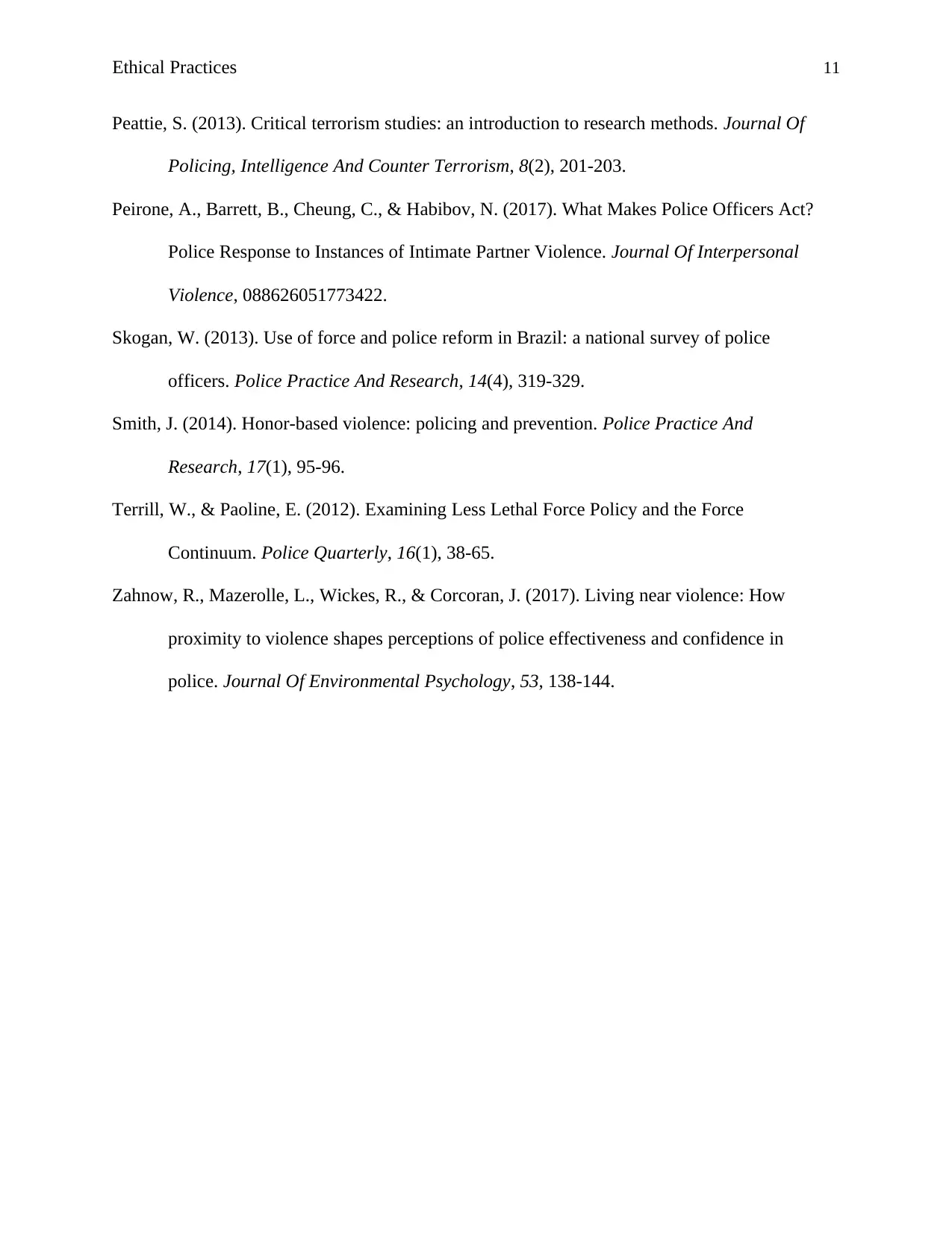
Ethical Practices 11
Peattie, S. (2013). Critical terrorism studies: an introduction to research methods. Journal Of
Policing, Intelligence And Counter Terrorism, 8(2), 201-203.
Peirone, A., Barrett, B., Cheung, C., & Habibov, N. (2017). What Makes Police Officers Act?
Police Response to Instances of Intimate Partner Violence. Journal Of Interpersonal
Violence, 088626051773422.
Skogan, W. (2013). Use of force and police reform in Brazil: a national survey of police
officers. Police Practice And Research, 14(4), 319-329.
Smith, J. (2014). Honor-based violence: policing and prevention. Police Practice And
Research, 17(1), 95-96.
Terrill, W., & Paoline, E. (2012). Examining Less Lethal Force Policy and the Force
Continuum. Police Quarterly, 16(1), 38-65.
Zahnow, R., Mazerolle, L., Wickes, R., & Corcoran, J. (2017). Living near violence: How
proximity to violence shapes perceptions of police effectiveness and confidence in
police. Journal Of Environmental Psychology, 53, 138-144.
Peattie, S. (2013). Critical terrorism studies: an introduction to research methods. Journal Of
Policing, Intelligence And Counter Terrorism, 8(2), 201-203.
Peirone, A., Barrett, B., Cheung, C., & Habibov, N. (2017). What Makes Police Officers Act?
Police Response to Instances of Intimate Partner Violence. Journal Of Interpersonal
Violence, 088626051773422.
Skogan, W. (2013). Use of force and police reform in Brazil: a national survey of police
officers. Police Practice And Research, 14(4), 319-329.
Smith, J. (2014). Honor-based violence: policing and prevention. Police Practice And
Research, 17(1), 95-96.
Terrill, W., & Paoline, E. (2012). Examining Less Lethal Force Policy and the Force
Continuum. Police Quarterly, 16(1), 38-65.
Zahnow, R., Mazerolle, L., Wickes, R., & Corcoran, J. (2017). Living near violence: How
proximity to violence shapes perceptions of police effectiveness and confidence in
police. Journal Of Environmental Psychology, 53, 138-144.
⊘ This is a preview!⊘
Do you want full access?
Subscribe today to unlock all pages.

Trusted by 1+ million students worldwide
1 out of 12
Related Documents
Your All-in-One AI-Powered Toolkit for Academic Success.
+13062052269
info@desklib.com
Available 24*7 on WhatsApp / Email
![[object Object]](/_next/static/media/star-bottom.7253800d.svg)
Unlock your academic potential
Copyright © 2020–2026 A2Z Services. All Rights Reserved. Developed and managed by ZUCOL.





